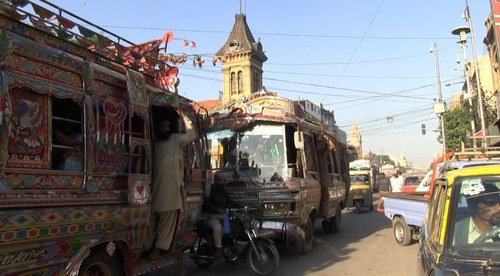Earlier this month, the government of Punjab declared a smog emergency. A few days later, the Lahore High Court ordered school and office closures twice a week to mitigate smog in the largest city of Punjab.
According to a 2018 study, air pollution comes from vehicular emissions, industry and agriculture through crop burning.
The electric vehicle revolution
Globally, the electric vehicle (EV) revolution is accelerating, driven by environmental concerns and advancements in automotive technology. Yet, Pakistan’s advancement to the shift remains tepid. This is proven by the low EV adoption rate in Pakistan compared to India and the rest of the world. In 2022, about 8,000 EVs were sold in Pakistan, compared to over a million in India.
For Pakistan, a country with severe economic issues, developing and successfully implementing a robust EV policy is not just an opportunity but a necessity. The current policy landscape, while a commendable start, requires significant refinement to foster local manufacturing of EVs and to judiciously manage the import of foreign electric vehicles, including the import of the parts and materials that make up various vehicle components.
Significant refinement is needed to foster local manufacturing and judiciously manage the import of foreign electric vehicles and their parts
For example, indigenous development of electric drive-trains must also be incentivised and subsidised if needed. Essentially, the EV policy must go one more level deep.
Current state of EV policy
Pakistan’s initial steps towards an EV policy have been promising, showing a willingness to embrace cleaner, more sustainable transportation solutions. It also appears to encourage localisation as seen by higher duties on parts which are available locally otherwise. Complete Build Units (CBUs) do have a higher duty structure.
However, the policy in its current form appears to be more conducive to the import of EVs and EV parts rather than truly supporting local manufacturing. For example, working with a few local manufacturers for the development of electric motors, domestic firms find is cheaper to import electric motors from China compared to manufacturing the same electric motor locally. Electric drive-train is the heart of an EV and incentives to manufacture it locally need to be clearly added.
Need for policy evolution
By evolving its EV policy to clearly favour local manufacturers, Pakistan can stimulate significant economic growth. Developing a local EV industry would create numerous jobs, from manufacturing to after-sales services, thereby reducing unemployment and boosting the economy.
Encouraging local manufacturing will necessitate technology transfer and skill development. This will not only build a technically skilled workforce but will also pave the way for Pakistan to become a regional hub for EV technology.
A heavy reliance on imported vehicles contributes to a large trade deficit. By promoting local manufacturing, Pakistan can reduce this deficit significantly, leading to a more balanced and resilient economy.
Recommendations
The government should introduce incentives such as tax breaks, subsidies, and research and development grants for local EV manufacturers. This will lower the entry barriers for new companies and encourage existing manufacturers to transition to EV production.
At Zyp Technologies, we have found Pakistan has all the right talent and resources to build things from scratch locally. Talent also has the right hunger level to build something big for Pakistan. We just need to provide opportunities and a conducive environment.
Investment in EV infrastructure, including charging stations and maintenance facilities, is crucial. Electricity rates for charging stations need to be lower than home charging rates, otherwise, the entire premise of EV running costs being lower doesn’t hold true compared to petrol vehicles. Businesses currently don’t find it feasible to install and operate charging stations for the masses.
Collaborations with educational institutions for specialised EV technology courses and training programmes will ensure a steady supply of skilled professionals in the EV industry.
While restricting imports outright may not be feasible, a balanced approach that gradually increases tariffs on imported EVs could be implemented. This would give local manufacturers time to establish themselves while still keeping the market open.
The evolution of Pakistan’s EV policy to favour full local manufacturing is a matter of national interest and a strategic imperative in the global race towards sustainable mobility. By taking decisive steps in this direction, Pakistan can not only improve air quality in its own cities but can also spur economic growth. The time for action is now, and the path forward is clear. The government, industry stakeholders, and the citizenry must come together to embrace and accelerate the change.
The writer is the CEO of Zyp Technologies
Published in Dawn, The Business and Finance Weekly, November 20th, 2023















































Dear visitor, the comments section is undergoing an overhaul and will return soon.